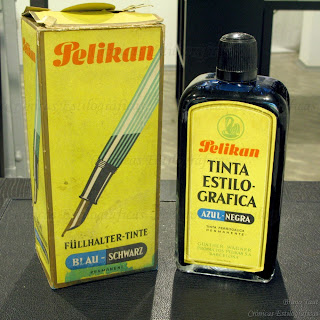Pen review of a Sailor pocket pen, 14 K gold nib, from around 1970.
Now we know pocket pens were probably invented by
Platinum in 1964, and that
Pilot released its first pocket pen model by the end of 1968. Nothing we know, though, about the origins of those pens when made by Sailor.
The pen under review today is a Sailor pocket with a sort of old look due to a number of reasons: short length, nib flexibility and shape, original clip…
 1. Appearance and design. (8.0/10)
1. Appearance and design. (8.0/10)This is an average looking pocket pen in terms of materials: plastic body, aluminum cap, steel clip, 14 K gold nib… Nothing special here. However, its very short length when capped gives this pen an additional appeal.
The clip is bended out of a single piece of steel, and resembles a paper clip. It adds an element of simplicity and functionality to the pen.
2. Construction and quality. (8.0/10)The pen seems to have aged quite well and only some scratches can be seen on the cap. The rest is perfectly functional and shows no blemishes. The cap fits tightly on both the section –to close the pen— and the barrel —to post and to write with it.
 3. Weight and dimensions. (9.0/10)
3. Weight and dimensions. (9.0/10)Small pen of average to low weight. It is so short that the option of writing with it unposted is almost out of the question unless the user’s hands were indeed small. But posted it is well balanced and comfortable to use.
Dimensions:
Diameter: 11 mm.
Length capped: 105 mm.
Length uncapped: 92 mm.
Length posted: 141 mm.
Total weight: 14.2 g (full)
Weight uncapped: 7.4 g (full)
(For dry weights, deduct 1 g from those values).
4. Nib and writing performance. (6.5/10)The nib is made of 14 K gold. It has no point indication but it is likely to be a fine (F). The more surprising detail is its flexibility. Contrary to the very stiff modern nibs by Sailor, this one is definitely springy, almost a semi-flex. And this soft feeling is especially pleasant to write.

The feed, on its side, is not always up to the challenge. For usual writing and note taking, it works perfectly; but a little extra push to explore the full flexibility of the nib breaks the ink drop and the nib railroads. This is not a flexible nib —the feed seems to say—and we should be content with its pleasant springy effect. But it is certainly frustrating—the nib promises but the
drunken sailor’s feed fails to deliver.
The bottom line is that this is a nice writer within its limits of ink flow.
5. Filling system and maintenance. (6.0/10)Records say that Sailor used to market small converters for its pocket pens. But I have never seen any of those and neither can I say whether they would fit in these very short pens.
In any event, this one is now a cartridge-only pen, and only those manufactured by Sailor. This might not be a problem in Japan, but it is in other markets where the distribution of Sailor products is very unreliable. The options, then, are refilling the cartridges and using it as an eyedropper. The connecting piece between section and barrel is made of steel and some people might be afraid of corrosion due to the ink.
Maintenance-wise, this pen is quite easy. Nib and feed can easily be extracted by unscrewing the nipple and pushing them up the section.
 6. Cost and value. (9.5/10)
6. Cost and value. (9.5/10)Pocket pens are easily available in the second hand market and as NOS (New Old Stock). Save a couple of examples, they are cheap and make good writers.
 7. Conclusion. (47.5/60=79/100)
7. Conclusion. (47.5/60=79/100)There are a number of features that make this pen special: its very compact dimensions, the springy nib, the original clip. On the negative side, this is a cartridge-only pen, and the frustrating feed. But it is indeed a nice writer.

(Sailor pocket pen, 14 K gold nib – Sailor black)
Bruno Taut
July 22, 2011
[labels: Sailor]
 A lot could –and should— be said about how much ink we store and the reasons for such behavior. However, in what seems like a distant past, when fountain pens were the tool of choice there were big bottles of ink to be used in schools and offices. This was the case of this one-liter bottle of ferrogallic blue-black Pelikan ink from around 1960.
A lot could –and should— be said about how much ink we store and the reasons for such behavior. However, in what seems like a distant past, when fountain pens were the tool of choice there were big bottles of ink to be used in schools and offices. This was the case of this one-liter bottle of ferrogallic blue-black Pelikan ink from around 1960. A liter of ink for 53 pesetas... Made by Productos Pelikan S. A, Barcelona. And with the name of Günther Wagner on the box...
A liter of ink for 53 pesetas... Made by Productos Pelikan S. A, Barcelona. And with the name of Günther Wagner on the box...

















































